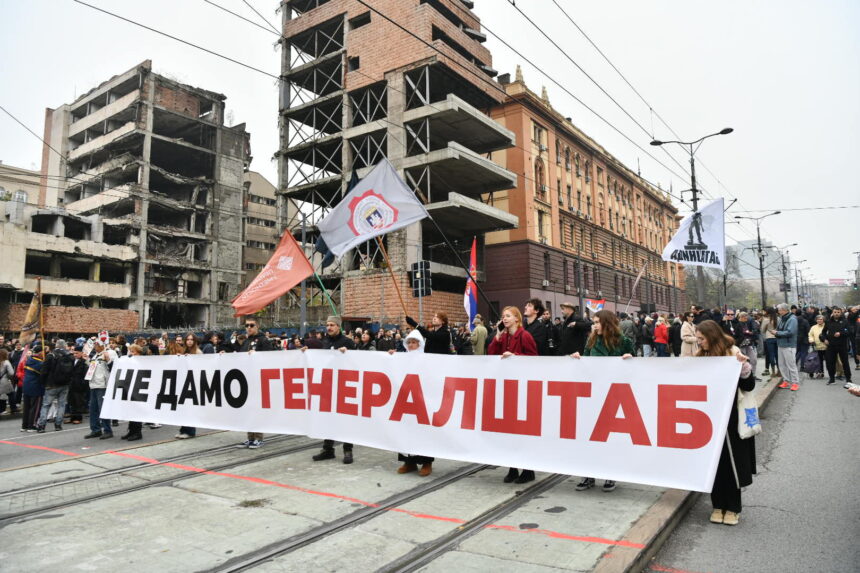Serbia’s government has pushed through one of its most contentious legal maneuvers to date, fast-tracking a lex specialis that strips the former Yugoslav General Staff complex of its cultural heritage status — a move widely seen as an act of political force designed to satisfy private and geopolitical interests rather than protect public heritage.
The decision, formally adopted with the backing of 110 MPs from the ruling SNS, bypassed standard procedures, avoided public hearings, and overrode Serbia’s entire cultural-protection framework. Legal experts describe the law as an unprecedented suspension of the rule of law, raising concerns that any monument in Serbia can now be erased at political will.
Vučić’s Pressure on Experts: “They Can’t Sign, But I Can Decide”
According to sources close to the ongoing criminal investigation, President Aleksandar Vučić personally pressured heritage officials to declare that the General Staff building—designed by architect Nikola Dobrović and long recognized as a cultural monument—was no longer protected.
When the former director of the Belgrade Institute for the Protection of Cultural Monuments, Olivera Vučković, explained that experts cannot legally sign off on something that is untrue, and that the government could instead bypass procedure by issuing a lex specialis, Vučić reportedly exploded in anger, insulting those present and calling them “lazy” and “ignorant.”
Her refusal became one of the last institutional obstacles preventing the full erasure of the General Staff from Serbia’s registry of protected sites.
Institutions Silenced: “In Serbia, Law Is Optional for the Powerful”
The Constitutional Court, which should have reviewed the legality of the government’s actions, has been inactive for nearly a year. This paralysis has allowed the executive branch to push through measures that conflict with Serbia’s legal obligations — including international conventions on cultural heritage.
Heritage professionals within the Republic Institute for the Protection of Cultural Monuments were the only remaining barrier, refusing to delete the General Staff from the Central Register despite pressure. Their stance complicated the issuing of construction permits because the property still carried the legal “heritage burden.”
Unable to tolerate even that limited resistance, the ruling party turned to a legislative shortcut.
A Law Written for One Investor — and Made to Avoid Public Scrutiny
The new lex specialis was not submitted by the government, which would have required public consultation, but by SNS MPs — a tactic used specifically to evade democratic procedures.
The project is tied to an agreement with Jared Kushner’s firm, Affinity Global Development, aimed at constructing a luxury hotel complex on the site. The government has repeatedly refused to disclose the agreement, rejecting requests from watchdog organizations such as Transparency Serbia.
Despite denials from officials, Jared Kushner himself confirmed the authenticity of the leaked project documents earlier this year.
Experts: “Tomorrow They Could Pass a Law to Demolish St. Mark’s Church for a Shopping Mall”
Legal experts warn that the new law sets a dangerous and authoritarian precedent.
Jovan Rajić, a prominent attorney, stated:
“This law suspends entire segments of Serbia’s legal order. Tomorrow, MPs could pass a law to demolish St. Mark’s Church because it doesn’t bring enough revenue, and build a shopping mall instead.”
He emphasized that the lex specialis effectively neutralizes the professional authority of cultural institutions and leaves citizens with no meaningful legal remedy, given the compromised state of Serbia’s judiciary.
Destruction Before Approval: Law Allows Demolition Without a Building Permit
One of the most alarming provisions allows the state to issue a special permit for preliminary works — including demolition — before any building permit is issued.
This means the General Staff complex could be razed even if the investor never presents an acceptable project.
The measure echoes past examples, such as the illegal night-time demolition in Savamala — a reminder of the government’s willingness to use extralegal means to clear land for favored investors.
Government Strategy: Attack the Experts, Rewrite the Narrative
Faced with growing public anger and an expanding criminal investigation into irregularities, Vučić and SNS officials have launched a coordinated smear campaign against cultural experts.
SNS representative Milenko Jovanov dismissed heritage institutions as “social parasites,” even attacking the legacy of architect Nikola Dobrović, whose work is internationally recognized.
Meanwhile, Vučić has accused prosecutors examining the General Staff case of being a “corrupt gang,” prompting strong condemnation from the Organized Crime Prosecutor’s Office, which warned that his remarks constitute pressure on the judiciary and obstruction of justice.
Legal, Cultural, and Moral Collapse
While the government promotes the project as one of “national interest,” the lex specialis provides no details on how demolishing a historic complex and building luxury real estate would benefit the Serbian economy.
As Transparency Serbia’s Nemanja Nenadić notes:
“If the government truly believed these rules were legitimate, they would change the general laws — but they don’t. They know what they’re doing is wrong, and so they hide behind special laws designed to mask legal violations.”
The push to erase the General Staff is widely seen as a symbol of Serbia’s broader democratic backsliding: heritage laws suspended, institutions bypassed, experts insulted, courts silent, and public interest subordinated to private deals.
And, as critics warn, once a government demonstrates that it can rewrite the law to erase a monument, there are no longer any limits on what it can erase next.





